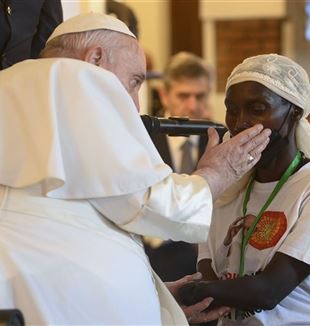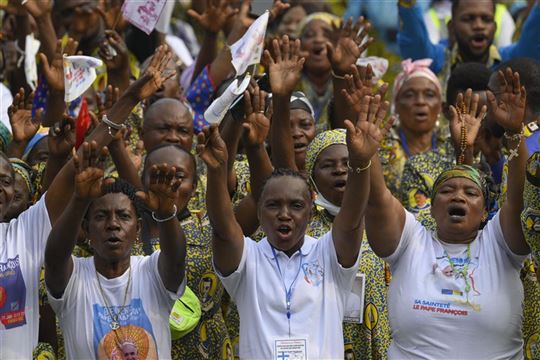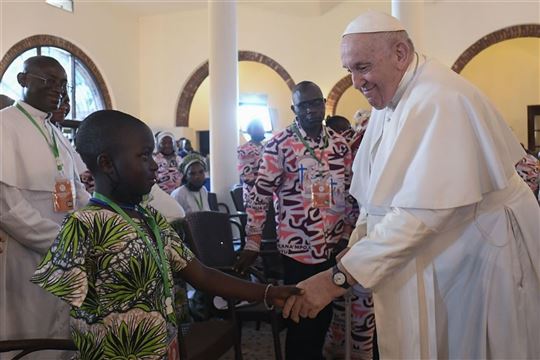
Africa: Traveling with the Pope, another world within this world
Among the various stages on Francis' visit were meetings with victims of the violence of a war that has plagued Congo for decades. And the blossoming of a "sudden beauty" you would not expect.There are some Apostolic visits that are like punches in the stomach, during which you experience events that take your breath away. I have already been to Africa about 20 times, either on trips with the Popes or to do other reports. I have entered remote villages and shattered urban suburbs with open sewers, encountered witches and sorcerers, embraced children in mud shacks where human pity rises to your throat and seems to suffocate you. But I have also seen wealthy neighborhoods that look like "another country" within the same country. In various nations, I have discovered the extraordinary work done by volunteers like those of AVSI; they are light in the darkness and carelessness of the planet, sparks of hope in places where the natives do not even have the courage to utter that word.
Of course, one never gets used to the suffering, hardship, to the violence endured. But sometimes something amazes you even more, so much so that it becomes a headline in the news, like the million people who attended the colorful mass in Kinshasa (I interviewed people who walked days and days to get there). Even though I did not expect it, as soon as he arrived in Congo, during his first public meeting before the President and political authorities, the Pope immediately and forcefully called for free and democratic elections; and despite the fact that before Francis met with a group of them, I was not aware that there are as many as 4 million displaced people in South Sudan out of a population of only 12 million... "Despite" all of this, it is a "minor" encounter that astounds and moves me to tears. A punch in the stomach.
Democratic Republic of Congo, in the afternoon. A small room of the Nunciature, the Holy See's embassy in the country, the house where Francis ate and slept during the days of his visit. Several victims of violence in the east of the country came to see him, where the Pope wanted to visit but could not because of security issues. There, war rages with unimaginable cruelty. On the outbound flight to Africa, as I stopped by to greet the Pope, I handed him a letter from Mother Rosaria, the Mother Superior of the Trappist monastery in Vitorchiano, in which she asked the Pontiff for a special blessing for the Trappist monastery in Mokoto, located in the eastern part of the Democratic Republic of Congo. She told him that during the conflict with Rwanda, a large number of displaced people had been given refuge within the monastery’s properties, having fled there to escape the devastation and murders perpetrated in nearby towns and villages. The monks had offered them all the possessions they had, but they were forced to leave the monastery to save their lives. Seven hundred people were slaughtered inside the church, and the monastery and the church itself were set on fire. The monks have now returned there, along with the many they protect. But again, Mother Rosaria wrote, today they are in great danger, surrounded and isolated, and with the possibility of being attacked again because of the hospitality they offer those people.
In Congo, the war that has been raging for decades has claimed 5 million lives, an incredible figure but unknown to most in the West. And in South Sudan, which broke away after a bloody civil war from the North and became the world's youngest nation, conflict and violence equally continue. Pope Francis, during the trip, pointed to the arms trade as the worst plague of our time, denouncing how, in the two nations he visited, it is foreign economic powers that rely on domestic corruption that fuel the wars, through which they can exploit the two countries' extremely rich subsoil. "Diamonds with blood," Bergoglio called the jewels that are proudly sold and displayed as an image of beauty in wealthy countries. The victims who met the Pope in the Nunciature, on the other hand, have never seen those jewels worn by the "wealthy women" of the West. Their eyes are filled with something else.
One of the visitors was Ladislas, 15, who recounted how she saw, from a hiding place, men in military uniforms tear her father to pieces and put his head in a basket, which they took away with her mother, who has never been found. There was also Léonie, who is in elementary school and saw her family members killed one by one, only to receive the bloody knife in her hands from the executioners as they laughingly told her to hand it over to the Armed Forces. And Kambale, 13, who was kidnapped and turned into a child soldier; and then there was Bijoux, 17, who three years ago was kidnapped along with other girls on her way to fetch water and, she said, "for years I was raped as if I were an animal, and forced to undergo unspeakable torture." She has twin girls with her, born of that horror and raised by her when, after two years, she managed to escape. Her friends never returned.
Together with the Pope, we listen to the testimony of Dèsiré, who was living in a camp for displaced people when an armed group arrived: "I saw the savagery: people torn to pieces, women disemboweled, men beheaded." Also in the room, recounting, was Emelda, kidnapped at 16 and used as a sex slave. Every day five to ten men abused her, and she and her companions, were forced to live naked so that they would not escape, and were forced to eat, every day, the flesh of the men killed by their captors: "Those who refused to eat were torn to shreds, and the others were forced to eat the pieces." Devastating and terrible tales; it is terrible not only simply to read them, but to hear them out loud and see the faces of those who have experienced this, showing that war is disgusting and filthy, always and everywhere, because it exalts man’s evil when they have not been educated to anything else.
Yet, after these tales of horror, something profoundly, radically different emerged, of utter surprise. What emerged, suddenly, was an "other world" within this world.
Read also - Turkey: "Amid the rubble, we are living stones"
One by one, child, teenager, woman or man, having finished their own accounts before the Pope (who says that their tears are his tears, their pain is his own pain), stood beneath the Crucifix, and at the foot of the image of the sufferings endured by Jesus they laid down the symbols of the tortures they have endured. They uttered humanly unimaginable words, which do not seem possible to hear after hearing what they have endured. Each one offered their sincere forgiveness to those who did those terrible things to them: "We, the victims of atrocities and other disasters, forgive our executioners for all they have done to us, for inflicting unspeakable acts of violence on us," said Emelda, as she laid clothes similar to those of the gunmen who had used her as their property beneath the cross. A machete like those used by the men that Désiré had seen kill men and woman was laid at Jesus’ feet; and then a mat, brought by Bijoux, who described it as "a symbol of my misery as a raped woman"; and a knife "like the one I saw my father hacked to pieces with," said Léonie.
Forgiveness. A word that, as Pope Francis closed his eyes to barely restrain his tears, blossoms surprisingly, like a flower of sudden beauty, on the lips of those who have encountered, by Grace, a different world in a world ravaged by horror and violence.
*Vaticanist Sky TG24